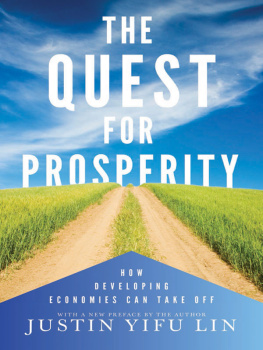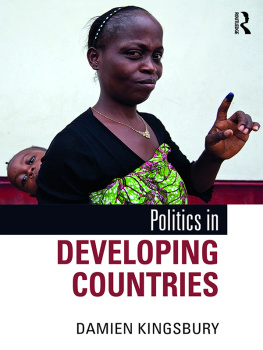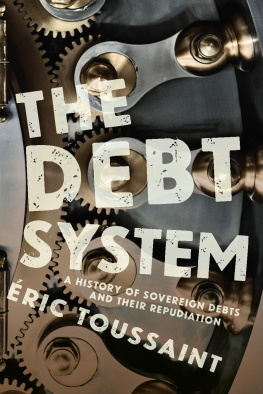
Praise for The Quest for Prosperity
This is a must-read for anyone interested in the emerging consensus on development policy. Justin Yifu Lin makes a powerful case for a new structural economics grounded in a very persuasive analysis of the evolution of ideas in economics. It will resonate especially well with practitioners familiar with the practical constraints of policymaking in developing countries.
Montek Ahluwalia deputy chairman of the Planning Commission of the Republic of India
In this masterpiece, Justin Yifu Lin weaves together 250 years of economic thought with his own wisdom acquired during Chinas economic rise. He dares to envision the end of world poverty and spells outthoughtfully, sensibly, and pragmaticallyhow this can be accomplished. It is impossible for an economist to write a better, or a more important, book.
George A. Akerlof Nobel Laureate in Economics
Combining valuable insights from his experience in China, his time as the World Banks chief economist, and the 2008 financial crisis, Justin Yifu Lins recommendations for development policy reflect an impressive and unique personal journey.
Kemal Dervis vice president of the Brookings Institution and former executive head of the UN Development Programme
The Quest for Prosperity is an important book. Written with verve and clarity, it reflects a deep understanding of global economic issues, and proposes practical solutions that anyone concerned with the plight of the worlds poor would be wise to read.
Robert Fogel Nobel Laureate in Economics
Justin Yifu Lins life journey has been one of discovery driven by insatiable curiosity. His invaluable contributions to economic theory and policy in these turbulent times are distinctive because of the sharpness of his observations, his willingness to rigorously test a hypothesis, and his courage to posit emerging views. The Quest for Prosperity builds on his already substantial contribution to development economics. It is a must-read for all policymakers and students.
Trevor Manuel minister in the presidency of the National Planning Commission of South Africa
Justin Yifu Lin lays out an innovative framework for understanding the mystery of economic growth, drawing insightful conclusions about the experience of successful economies that should provide important inspiration to developing countries as they seek to expand their comparative advantages and design their own growth strategies.
Ngozi Okonjo-Iweala finance minister of Nigeria
Justin Yifu Lin cracks the code of economic development in this extraordinary tour de forceoffering a rare combination of personal experience, rigorous analysis, and empirical investigation. His powerful recipe will become an enduring feature of future development efforts.
Stephen S. Roach former chairman of Morgan Stanley Asia and author of The Next Asia
Part personal narrative, part sophisticated economic analysis, this important book offers a new approach for accelerating economic development around the world. Justin Yifu Lins exceptional grounding in Chinese realities and Chicago economics, as well as his extensive experience, shine throughout.
Dani Rodrik author of The Globalization Paradox: Democracy and the Future of the World Economy
This is a truly exciting book. Speaking directly to the reader and quoting Lewis Carroll as easily as Simon Kuznets, Justin Yifu Lin proposes a new approach to development economics that makes great sense.
Thomas C. Schelling Nobel Laureate in Economics
This book is a tour de force: a seminal contribution to development studies that is engagingly, even entertainingly, written. Lin uses words, not statistics, to carry his arguments; and he illuminates abstract ideas with the dicta of people as diverse as Winston Churchill, Deng Xiaoping, and Mick Jagger.
Robert Wade London School of Economics and Political Science
THE QUEST FOR PROSPERITY
THE QUEST FOR PROSPERITY
How Developing Economies Can Take Off

JUSTIN YIFU LIN
with a new preface by the author
PRINCETON UNIVERSITY PRESS
Princeton and Oxford
Copyright 2012 Justin Yifu Lin
Requests for permission to reproduce material from this work should be sent to Permissions, Princeton University Press
Published by Princeton University Press, 41 William Street, Princeton, New Jersey 08540
In the United Kingdom: Princeton University Press, 6 Oxford Street, Woodstock, Oxfordshire
OX20 1TW
press.princeton.edu
All Rights Reserved
Second printing, and first paperback printing with a new preface by the author, 2014
ISBN 978-0-691-16356-7
The Library of Congress has cataloged the cloth edition as follows
Lin, Justin Yifu, 1952
The quest for prosperity : how developing economies can take off / Justin Yifu Lin.
p. cm.
Includes bibliographical references and index.
ISBN 978-0-691-15589-0 (hardback : alk. paper)
1. Developing countriesEconomic conditions. 2. Developing countriesEconomic policy. I. Title.
HC59.7.L41863 2012
338.90091724dc23
2012016049
British Library Cataloging-in-Publication Data are available
This book has been composed in Minion Pro with Knockout display by Princeton Editorial Associates Inc., Scottsdale, Arizona
Printed on acid-free paper.
Printed in the United States of America
10 9 8 7 6 5 4 3 2
CONTENTS
PREFACE TO THE PAPERBACK EDITION
I am lucky to have been the World Banks first chief economist from the developing world. Considered the highest public job for an economist, it traditionally was occupied by well-known economists from advanced countries. I was also lucky to experience two development miracles. Born in 1952 in Taiwan, which was as poor as most African countries then, I moved to Mainland China in 1979. By that time Taiwan had achieved a miraculous transformation to become a newly industrialized economy. Mainland China, however, was then as poor as when I was born and poorer than almost all African countries. But it achieved a miraculous transformation similar to Taiwans.
The two experiences convinced me that poverty is not destiny. Even though a nation may be trapped in poverty for centuries, it can change its fate and start on a dynamic path toward transformation.
The World Banks dream is a world free of poverty. When I accepted the offer to become its chief economist, I was inspired to draw on my experiences to contribute to the realization of that dream. As a Chinese intellectual, educated in Confucian tradition, I have been inspired to contribute my knowledge to the modernization of my motherland since I was young. The World Bank position gave me the privilege of interacting with many leading intellectuals in developing countries, and I was encouraged to find that they all shared the same inspiration for their nations. And no matter where I travelled in my World Bank capacity, I found that the peasants and workers in the developing world had the same desire to prosper as the peasants and workers I grew up with in Taiwan and Mainland China. They all hoped to have a better life for themselves and their younger generations through their own hard work.
The national leaders I met on various Bank missions were also keen to know how to bring prosperity to their nations. Fundamentally, they are rational and hope to stay in power. And if staying in power is not in question, they hope to have good names in their nations history. The best way to achieve both goals is to bring prosperity to their people. But except for a lucky few, the results have been disappointing in most developing countries, where poverty still prevails.
Next page







